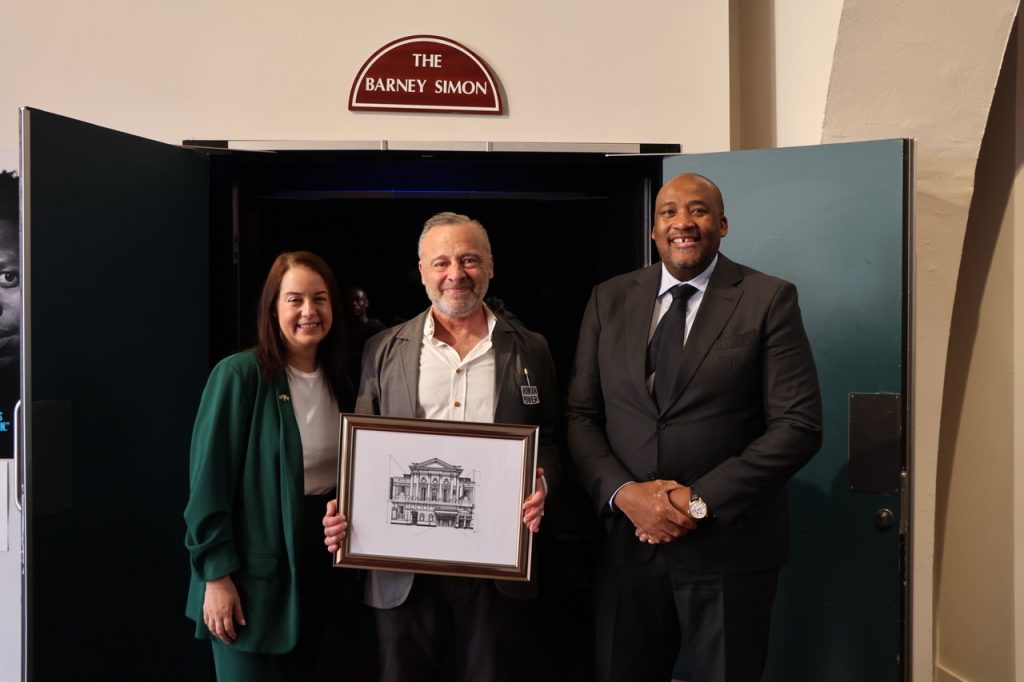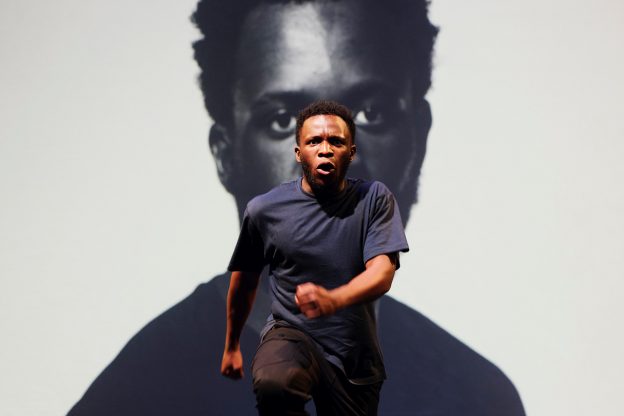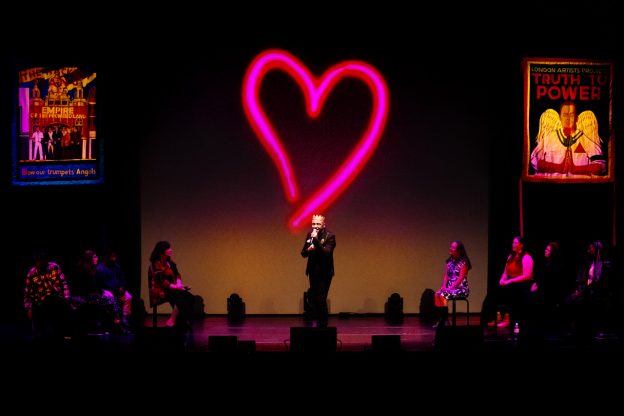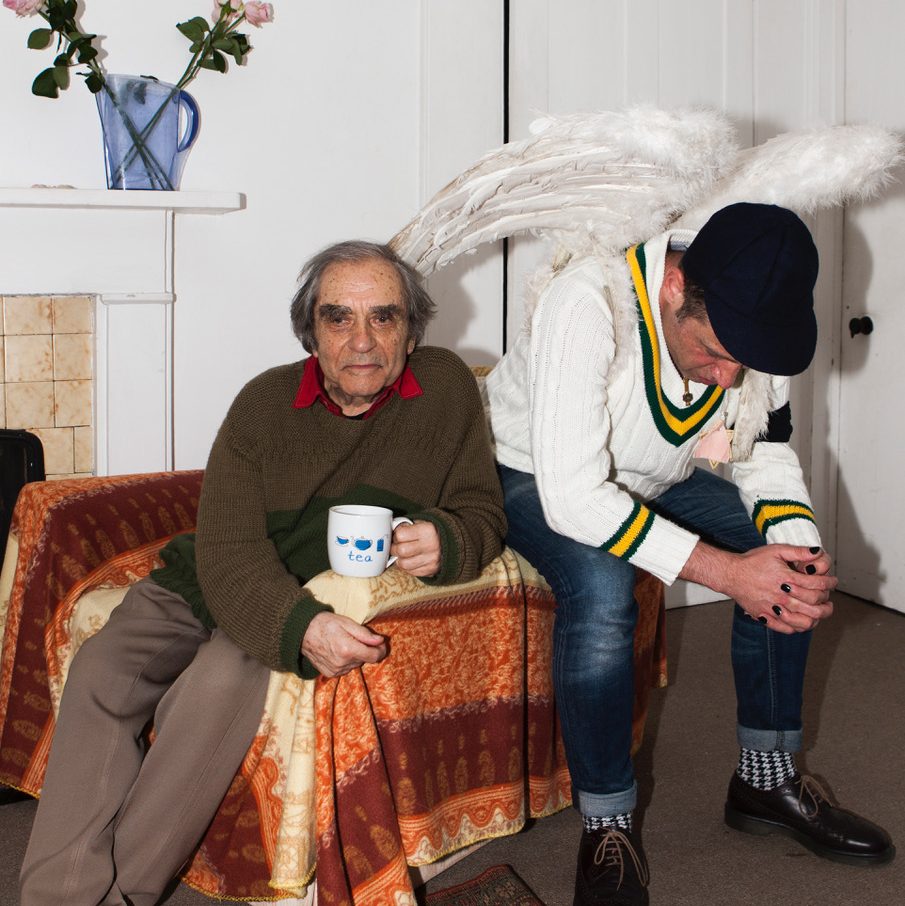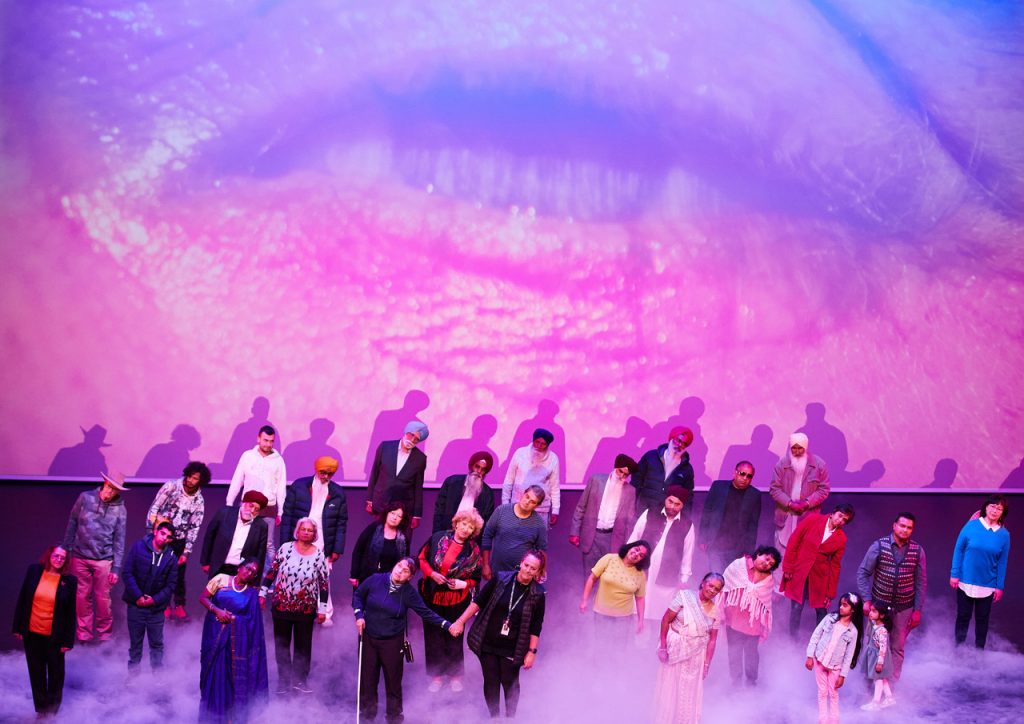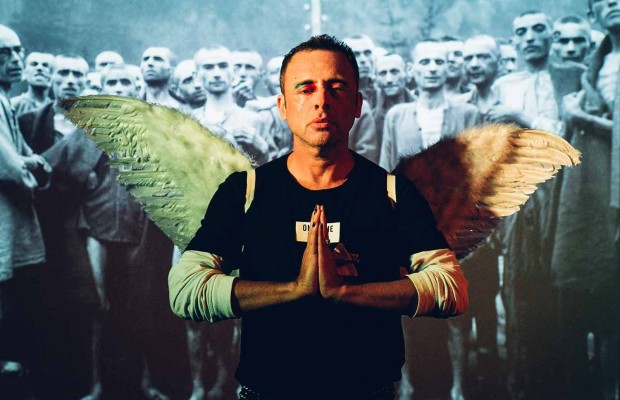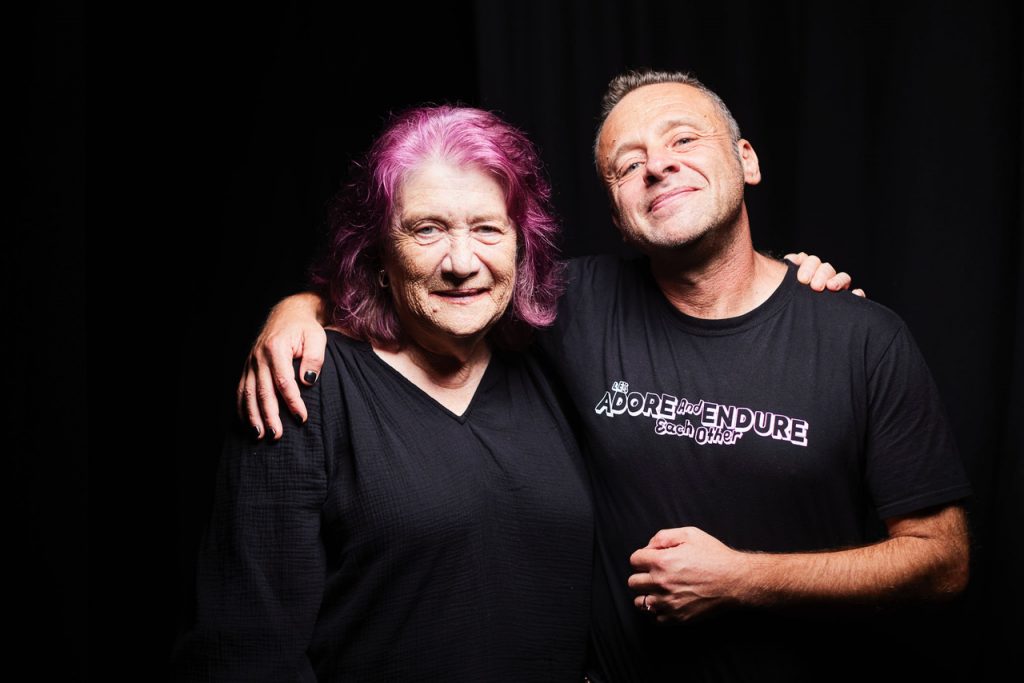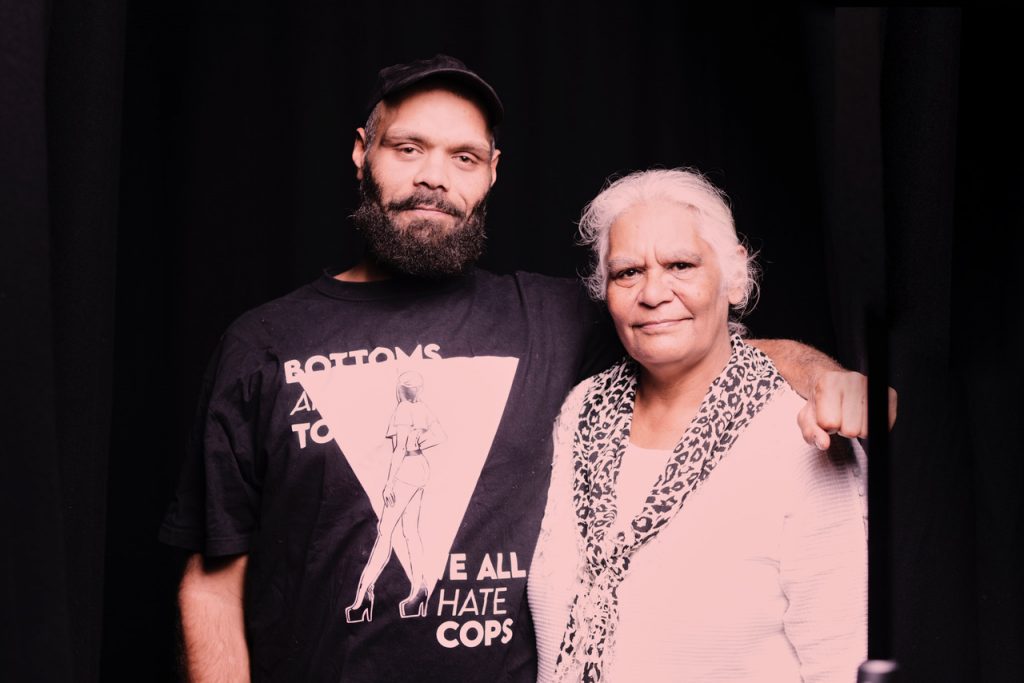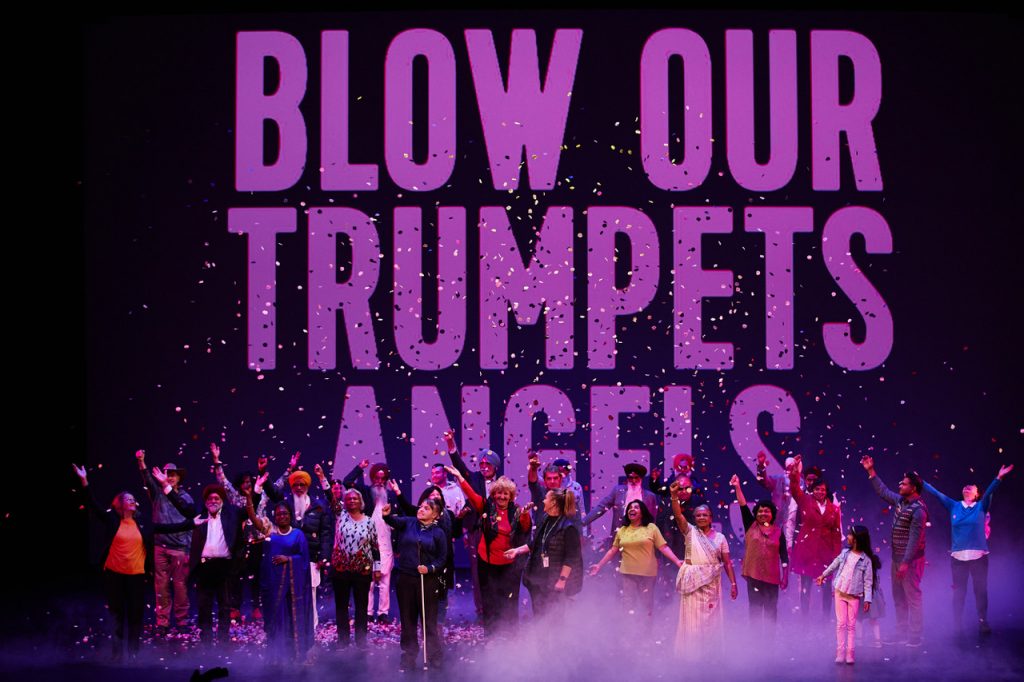Writer, director, performer, producer! Jeremy Goldstein’s latest project, This Is Who I Am, follows the enormous success worldwide of his Truth to Power Café. Here, he tells us about the show’s latest edition at The Market Theatre in Johannesburg.
I’m going to start by recalling how I came to discover the world-famous home of protest theatre, The Market Theatre in Johannesburg.
I first came across The Market Theatre at London International Festival of Theatre (LIFT) in 1999 – less than six years after Nelson Mandela and the African National Congress (ANC) toppled apartheid and came to power. Back then, I was LIFT’s fundraiser, working on a trilogy of productions from South Africa which in their very different ways dealt with the toxins of apartheid. There was Project Phakama, a new participatory arts project; William Kentridge and the Handspring Puppet Company’s production of Ubu and The Truth Commission, and Mehlo Players with The Khulmani Support Group in The Story I’m About to Tell at Tricycle Theatre (now Kiln Theatre) in northwest London.
Jump forward to 2022 and I’m mentoring Congolese theatre maker Eliezer Kasereka as part of the Total Theatre Artists as Writers project. We invited all twenty artists taking part in the project to write one hundred words in response to the title of my new show, This Is Who I Am.
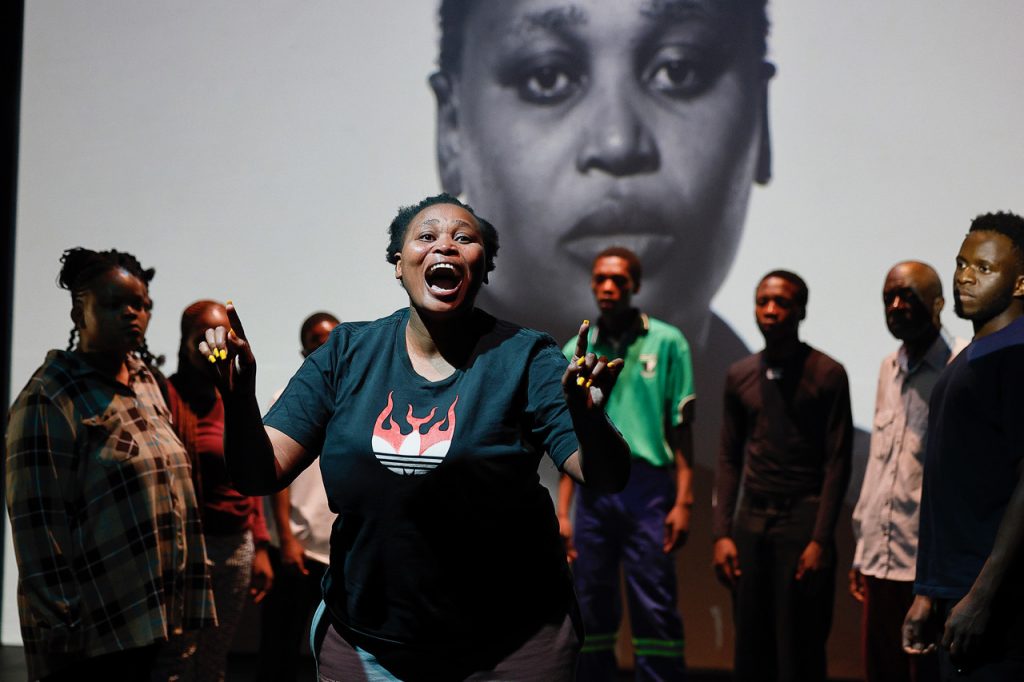
Conceived as a companion work to Truth to Power Café, This Is Who I Am is the younger sibling of a long-term theatre project inspired by the political and philosophical beliefs of Nobel Prize winning playwright Harold Pinter and his inner circle The Hackney Gang, who included my late father Mick Goldstein, and poet and actor Henry Woolf. For sixty years, The Hackney Gang remained firmly on the side of the occupied and the disempowered, believing in an independent media, and speaking their truth to power.
I didn’t plan it like this, but both projects have become my path towards truth and reconciliation marked by twenty-five years of AIDS/HIV activism and the very difficult relationship I had with my father. These are the stories I started telling in 2016 when I began working with Henry Woolf on Truth to Power Cafe – directed and developed by Jen Heyes.
Ten years into the work, over a thousand revealing portraits of identity have emerged, proving who we are is inseparable from trust, reliance, jealousy, and betrayal – themes which run through both Pinter’s writings and the real-life stories from participants that express the truth of their lived experience, in their own five-hundred-word-monologue.
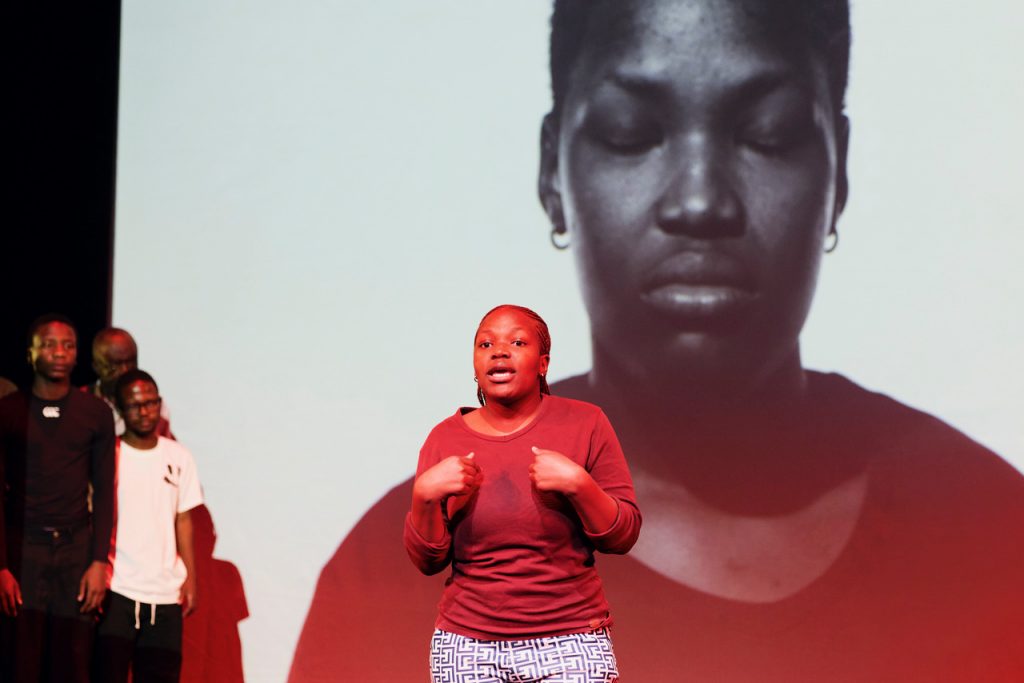
In Truth to Power Café participants write their monologue in response to the question: “Who has power over you and what do you want to say to them?” and in This Is Who I Am, monologues are written in response to the show’s title. From eyewitness accounts of the 1936 Battle of Cable of Street in London’s East End, to the 1984 Battle of Orgreave in South Yorkshire, to queer stories in the Australian outback, to our most recent theatrical journey into Hillbrow in inner-city Johannesburg – here, private memory meets public performance. Personal testimony and cultural history intertwine to create a living dialogue and an act of remembrance – an intersectional conversation across generations between the living and the dead.
I make multiple editions of both projects in the belief that the real power within the work is in the accumulation of untold stories and the compassionate truth-telling from those taking part.
Since its Singaporean premiere in 2022, I’ve re-created This Is Who I Am with older people at my mother’s aged care centre in Sydney, with queer identifying participants at Broken Hill City Art Gallery in the Australian outback, and at the mighty Queer Zagreb in Croatia.
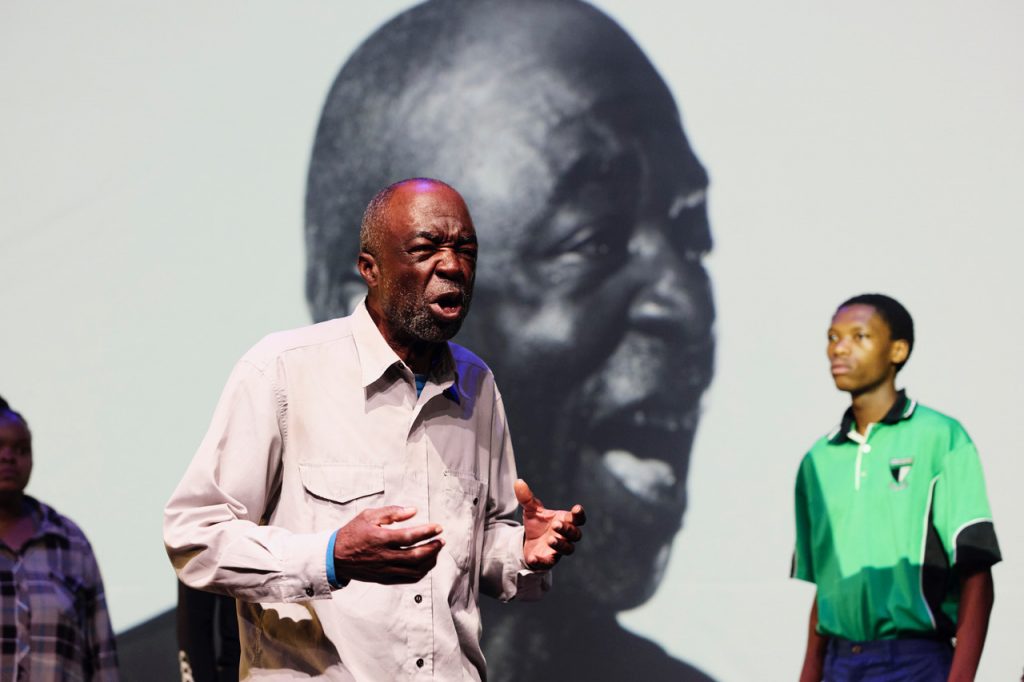
The fifth edition of This Is Who I Am is set in Johannesburg. Described by Nadia Virasmy as “a recalibration of time, space, experience and truth”, the work is a theatrical journey into Hillbrow and beyond; a place where history and present collide with contradictory illusions and dreams of a mercurial South Africa. A storied, yet troubled inner-city area of Johannesburg, Hillbrow remains a safe harbour for an ever-changing mix of iconoclasts.
Imbued with all the passion and power of ten deeply personal real-life stories driven by memory and desire, participant monologues – each one a play in waiting – were developed by Windybrow Arts Centre (a division of The Market Theatre Foundation) and Stacy M Hardy, Head of Creative Writing at Wits University. All ten monologues are co-directed for the stage and digital theatre screens by me and emerging independent Johannesburg based theatre-maker Jaden Mosadi. They have been created in collaboration with media editor Flick Harrison and photographers Roger Machin and Quintin Mills; and are individually scored by radically inclusive UK music makers Kris and Nicci Halpin of Dyskinetic, whose meditative rock ’n’ roll / trip hop /electronica soundscapes merge seamlessly with participants’ texts and glorious a-cappella South African song.
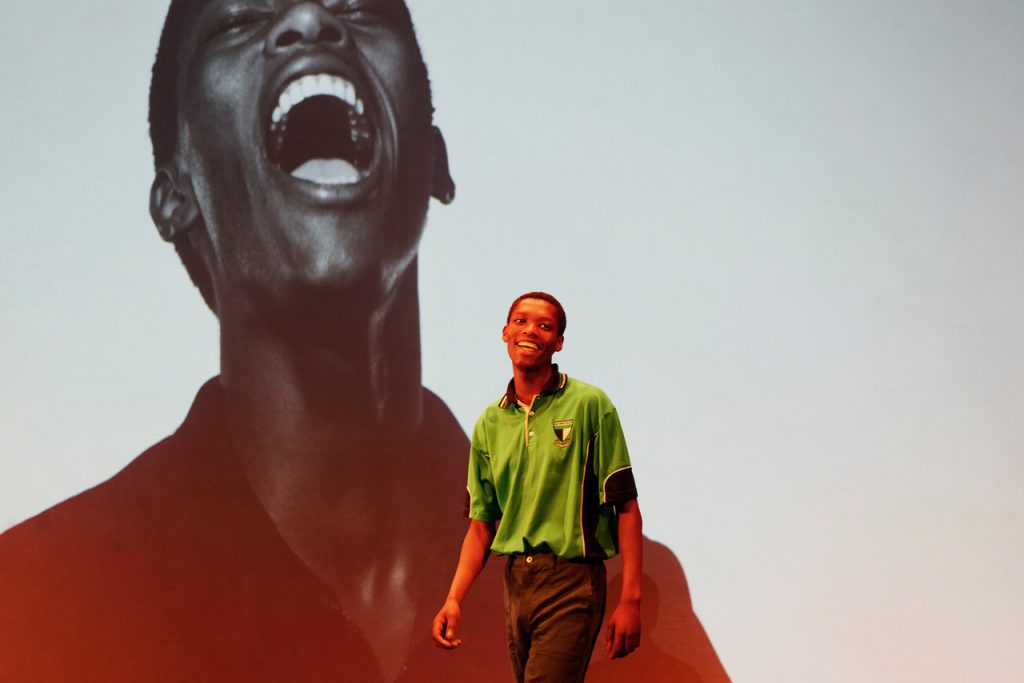
“I face life head-on to reclaim what was taken from me,” says Caleb Nyanguila from the Democratic Republic of Congo, recalling a traumatised childhood. Sandiso Mbatha is a schoolboy who longs for a big brother, and to rebuild the home of his grandmother, “the home that doesn’t feel like home anymore”. Reneilwe Leopeng, a first-year student at The Market Theatre Laboratory, says “hold your breath and gaze upon my imperfections for you will see what death looks like”; as Minenhle Masina, a young student, struggles to come to terms with her upbringing “blaming no one but myself for not speaking up”. And Gcebile Dlamini, an award-winning theatre activist and an alumnus of Arts & Culture Trust in Johannesburg, returns to the stage to disclose an intimacy story she was forbidden to tell her father when he was alive.
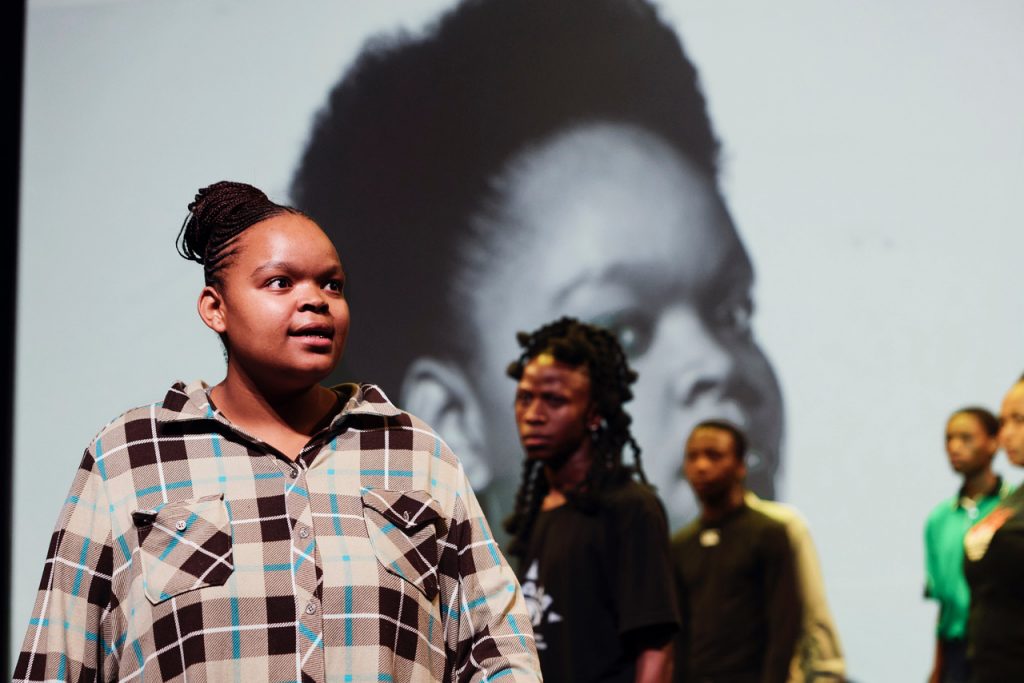
Participants from the homeless theatre company Johannesburg, Awakening Minds, resident at Windybrow Arts Centre, include writer Teshiyaya Kalombo, and non-binary storyteller Tyson Nkala. Tyson, who grew up in Hillbrow, talks about their life as a “shattered illusion” while desperately seeking the warmth of a happy family, which they found in homeless shelters with Tshiyeya Kalombo. Writing from a park where they sometimes sleep, Tshiyeya’s epic state of the nation address about homelessness demands justice and dignity and the right to a better future.
Hlengiwe Masonda and Simphiwe Dube are both members of the Johannesburg Society for the Blind: “Although my eyes cannot see,” says Hlengiwe, “in the darkness I find my way with all the world’s delight”; and Simphiwe, a sporting champion, tells us that “playing blind soccer is how I learned to see through sound”.
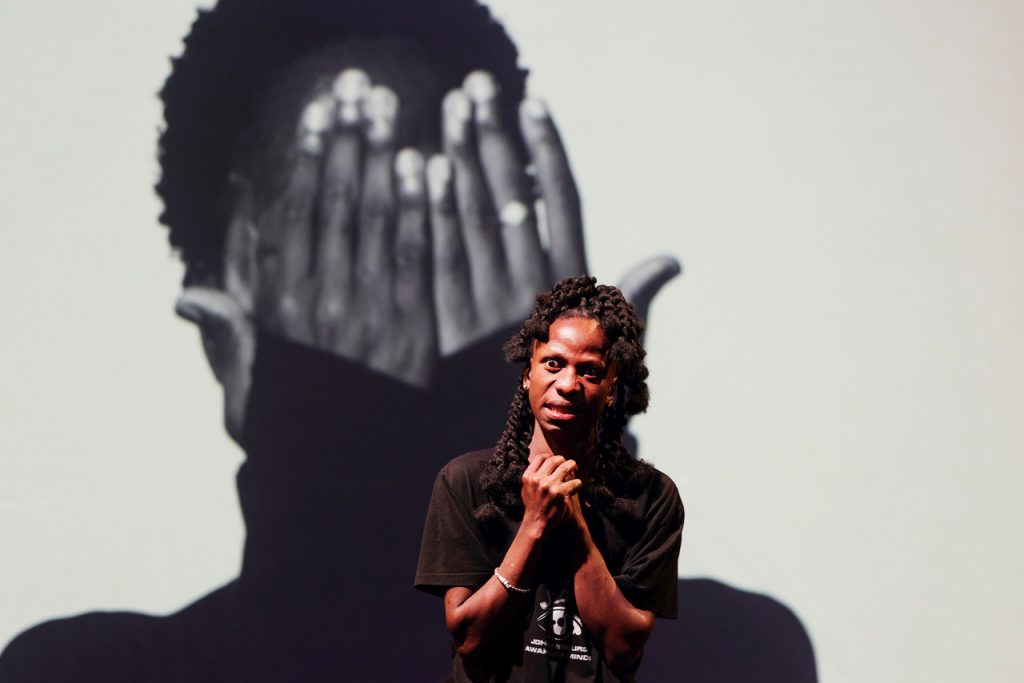
Thabang Lucky Matsaung’s monologue traces his disillusionment through the burial of his two favourite childhood action figures, and ends with a re-enactment of his grandmother’s pep talk:
1 “If it bleeds it can be killed”
2 “Don’t ever let a man belittle you to feel manlier”
3 “Polish your school shoes and wash your uniform every day”
4 “Wash the chicken before you season it”
5 “Don’t you dare shed a tear”
6 “If I catch you in front of the mirror or touching water during a storm, you’ll wish the lightning struck you before I did”
7 “God can only do so much. Protect yourself and meet him halfway”
8 “Swim in the waters like you’ve been there before”
9 “Take off your hat in the house when you eat”
10 “You don’t have roll-on? Okay dip the soap bar into water and rub it on your armpits”
“These are the words from my guardians,” says Thabang, “words that build me” – words of wisdom and defiance.
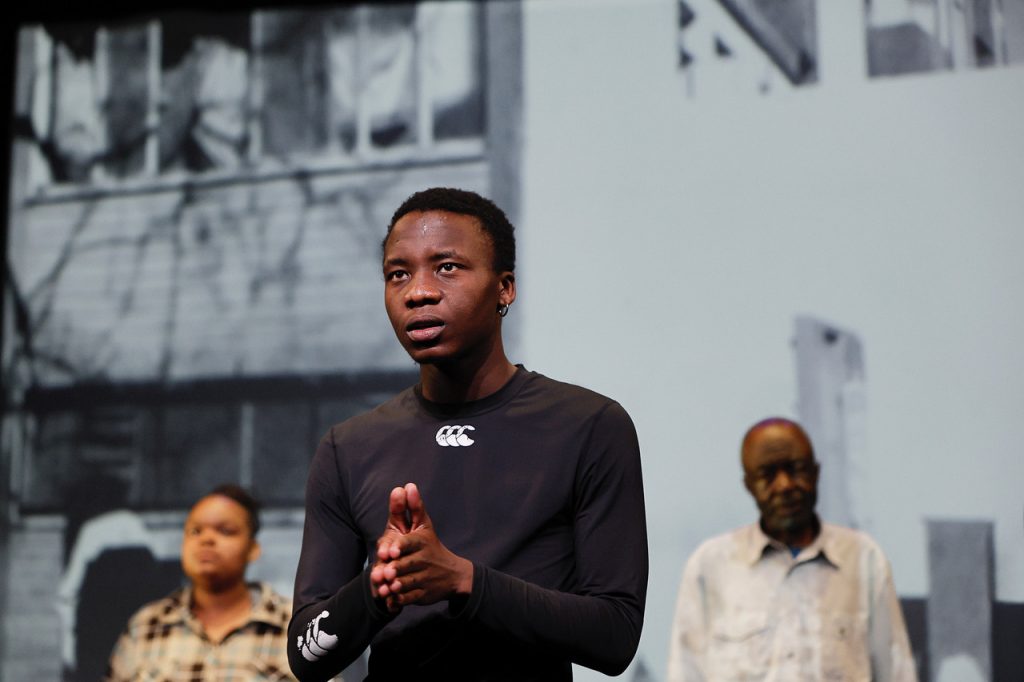
At the end of the show a chorus of “THIS IS WHO WE ARE” rings out from the stage as rose petals drop from the rig. The fourth wall breaks as the audience storm the stage and become one with the participants. It’s a moment of liberation and defiance that only live theatre can do.
In South Africa we played The Barney Simon Theatre which was named after one of The Market Theatre’s first artistic directors, and one of South Africa’s most courageous and innovative playwrights and directors.
Telling my story, as I did in 2016, has enabled me to connect with over a thousand other stories of loss, hope and resistance from people all over the world. Arguably, these stories would have never been told from our stages, so as 2026 comes into view, I realise the work is as much about me remembering the legacy of my father and his chums in The Hackney Gang, as it is about challenging the status quo of societal systems of oppression and power structures controlling our theatre
As our artistic freedoms and hard-won battles over diversity, equity and inclusion come under attack, our conversations between the living and the dead continue. Now more than ever we need to be controlling our own narratives, and holding space for others to do the same.
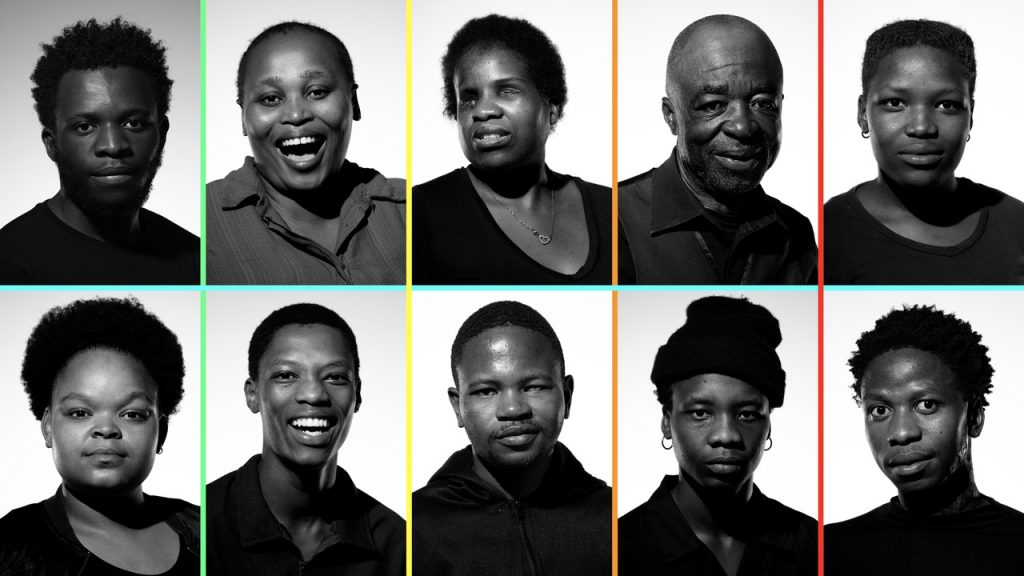
This Is Who I Am Johannesburg cast members: Caleb Nyanguila, Gcebile Dlamini, Tyson Nkala, Tshiyeya Kalombo, Sandiso Mbatha, Reneilwe Leopeng, Thabang Lucky Matsaung, Hlengiwe Masondo, Simphiwe Dube, and Minenhhle Masina.
Featured image (top): Caleb Nyanguila in This Is Who I Am Johannesburg. Photo Roger Machin.
For more on This Is Who I Am, Truth to Power Café, and other work by Jeremy Goldstein see London Artists Projects.
This Is Who I am Johannesburg digital theatre monologues will premiere at Johannesburg Film Festival 3-8 March 2026, followed by We The People Human Rights Festival on Constitution Hill at the end of March
This Is Who I Am Johannesburg is presented by British High Commission as an ongoing multidisciplinary, intercultural arts platform, and UK / South Africa cultural exchange. Launched at The Market Theatre as part of the G20 Culture Ministerial, the project is a London Artists Projects and Windybrow Arts Centre co-production supported by Canon South Africa.
